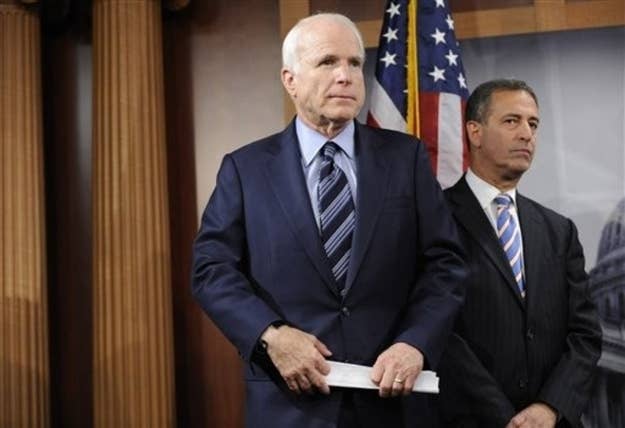
In an election cycle marked by the collapse of regulations on money in politics, political parties have now begun to erase the lines regulating another currency: Information.
Online workarounds that flout the spirit of laws against co-ordination between candidates, parties, and outside groups have emerged as a central part of the way the game is played, as Roll Call detailed in a story today focusing on the practice's technical aspects:
In an effort to avoid the duplication of resources and to keep the party on message, the committees are sharing more and more of the [opposition research] information online.
Because the research is public, it isn’t considered coordination and all four Senate and House campaign committees have used a network of websites to communicate messages in the past and will likely do so again.
Particularly aggressive: The Democratic Congressional Campaign Committee, which has put clip files and full opposition research books online, hidden in plain sight on its website.
Some version of this practice has been around for years, operatives say. But while files used to be stashed online for those in the know, committees knew they were walking a line, and sought to keep the practice low-profile. Now, hard-money committees like the DCCC are using public channels to telegraph their plans to deep-pocketed outsiders, as well as their own independent expenditure arms.
"It used to be public, but not this public, and you knew you were a little closer to the line," said a veteran opposition researcher, who spoke on the condition of anonymity, and acknowledged that campaigns have at times risked serious legal sanction to get around coordination laws that are now vitiated. "This is the first year where you know what the other side [that is, the allied candidate or committee] knows completely. You don’t even need a burner phone any more."
Mused a prominent Democratic operative: "We used to say that money in politics is like water on pavement, it will always find the cracks. Now it seems the same is true about information."
The new transparency between campaigns and the outside group that are, by law, walled off from them offers cash savings to both sides, who can share research, and it allows them to keep their messages in sync. But while court rulings have loosened the spending regulations, this is more the result of technology widening existing loopholes.
"Technology has been pushing for more openness on the research front for the past decade," said Jeff Berkowitz, a former Republican National Committee research director. "The advent of YouTube and online social networks
has accelerated that trend of openness far more than any developments in campaign finance law."
That doesn't mean that everything a campaign knows will be released online.
"There is still information held back, especially 'silver bullets' that they think could be a major turning point in the campaign and whose rollout the want to manage for maximum benefit," said a veteran Democratic oppo hand.
The consequence of the shift toward campaigns making their research stashes public, however, is to deal another blow to a complex campaign finance regime meant to discourage big-money outsiders and to prevent interest groups, business and labor alike, from effectively taking over campaigns in exchange for legislative favors. With money flowing freely and the notion of a wall between two committees collapsing, it's unclear what remains of the regime, aside from a set of technicalities that employ an army of Washington lawyers.
"This is the end of McCain Feingold," said the first opposition researcher, referring to the landmark campaign finance regulation. "Everyone has everything."
